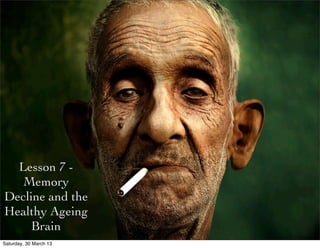
Lesson 7 memory decline and the healthy aging brain 2013
- 1. Lesson 7 - Memory Decline and the Healthy Ageing Brain Saturday, 30 March 13
- 2. From last Lesson........ What role does the hippocampus play in memory? Saturday, 30 March 13
- 3. From last Lesson........ What role does the hippocampus play in memory? Research suggests that the hippocampus is critical to the formation and consolidation of memories, playing part in deciding if information received a by the senses is worth remembering, then organising memories before directing them to other sections of the brain. Saturday, 30 March 13
- 4. Outcomes (What you need to know and be able to do) • Explain how memory changes over a lifespan • Explain amnesia resulting from brain trauma and neurodegenerative diseases including dementia and Alzheimer’s disease • Compare how memory declines over the lifespan with amnesia resulting from brain trauma and neurodegenerative diseases including dementia and Alzheimer’s disease Saturday, 30 March 13
- 5. Amnesia Amnesia – Loss of memory, partial or complete, temporary or permanent. Can be caused by either of: Saturday, 30 March 13
- 6. Amnesia Amnesia – Loss of memory, partial or complete, temporary or permanent. Can be caused by either of: Brain trauma – damage inflicted through injury interferes with functioning E.g. Brain injury, stroke, drug abuse etc Saturday, 30 March 13
- 7. Amnesia Amnesia – Loss of memory, partial or complete, temporary or permanent. Can be caused by either of: Brain trauma – damage inflicted through injury interferes with functioning E.g. Brain injury, stroke, drug abuse etc Neurodegenerative disease – decline in structure and function of neurons E.g. Alzheimer's disease Saturday, 30 March 13
- 8. Saturday, 30 March 13
- 9. Retrograde Amnesia Cant remember old information Events before the injury lost Usually temporary and caused by a blow to the head Memory of events immediately preceding the injury are permanently lost (interruption or consolidation) Saturday, 30 March 13
- 10. Retrograde Amnesia Cant remember old information Events before the injury lost Usually temporary and caused by a blow to the head Memory of events immediately preceding the injury are permanently lost (interruption or consolidation) Anterograge Amnesia Can’t make new Long Term memories of events that occur after the injury – hippocampus damage common Cannot transfer information from STM to LTM Saturday, 30 March 13
- 11. Anterograge Amnesia Saturday, 30 March 13
- 12. Retrograde Amnesia Saturday, 30 March 13
- 13. Memory decline over the lifespan Older people Do take longer to learn new information STM – Depends on the task, easy one part tasks are ok. Tasks that require divided attention are challenging for older people. LTM - Episodic down, Procedural same, Semantic Same Saturday, 30 March 13
- 14. Memory decline over the lifespan Not necessarily inevitable,however some natural decline is normal. Amount of decline depends on: • How retention is measured - Recall down, Recognition same • Motivation to remember • Self confidence • Nervous system condition Saturday, 30 March 13